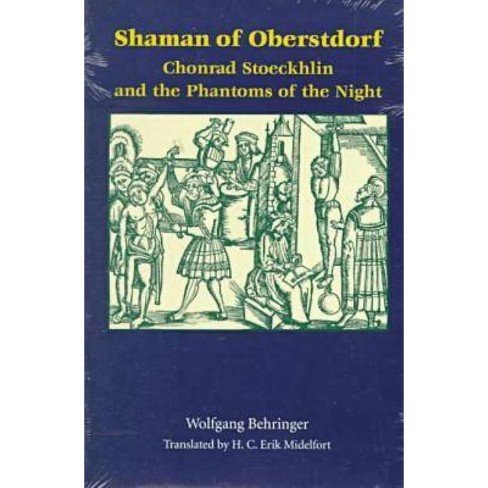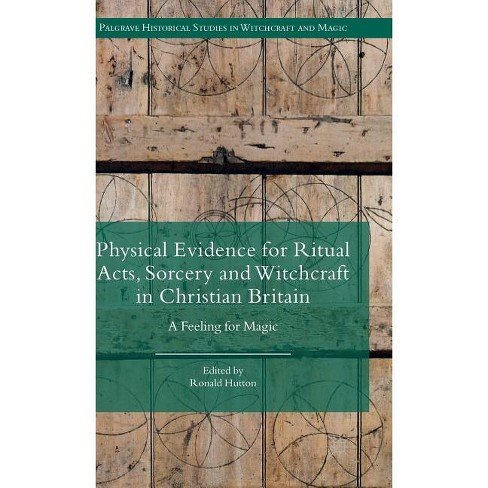Historia Veneficas
A collection of texts I recommend relating to the history of witchcraft, from a look at how they were treated to analysis of the various witchcraft practices across the British Isles and beyond. This is list is destined to never be truly complete but I hope to at least give the reader a starting point from which they can pursue their own avenues of study.
Cunning Folk and Familiar Spirits - Shamanistic Visionary Traditions in Early Modern British Witchcraft and Magic
Emma Wilby
The first major examination of the role that familiar spirits played in Britain during the Early Modern period, and compared similarities between the recorded visions and encounters with such spirits, with shamanism in tribal societies.
The Visions of Isobel Gowdie - Magic, Witchcraft and Dark Shamanism in Seventeenth Century Scotland
Emma Wilby
The first in-depth examination of the witch trial of Isobel Gowdie in 1662. Wilby obtained copies of the trial records, which had been presumed lost for two centuries, from which she concluded that Gowdie had been involved in some form of shamanic visionary trances.
Invoking the Akelarre
Emma Wilby
Wilby examines the controversial Basque witch craze that took place in 1609-14. Here she argues against the assumption by academic writers that the sensational accounts of the Black Mass and orgies at the witches’ sabbath were largely reflections of witchcraft propaganda and stereotypes imposed by inquisitors. As in her first two books, she suggests that the witch suspects used genuine memories and dreams linked to their own thoughts and experience when claiming they had been involved in these events.
The Cheese and the Worms - The Cosmos of a Sixteenth Century Miller
Carlo Ginzburg
The study examines the unique religious beliefs and cosmology of Menocchio (1532–1599), also known as Domenico Scandella, who was an Italian miller from the village of Montereale, twenty-five kilometers north of Pordenone. He was from the peasant class and not a learned aristocrat or man of letters, Ginzburg places him in the tradition of popular culture and pre-Christian naturalistic peasant religions. Due to his outspoken beliefs he was declared a heresiarch (heretic) and burned at the stake during the Roman Inquisition.
The Night Battles - Witchcraft and Agrarian Cults in the Sixteenth and Seventeenth Centuries
Carlo Ginzburg
In The Night Battles, Ginzburg examines the trial accounts of those benandante who were interrogated and tried by the Roman Inquisition, using such accounts to elicit evidence for the beliefs and practices of the benandanti. These revolved around their nocturnal visionary journeys, during which they believed that their spirits traveled out of their bodies and into the countryside, where they would do battle with malevolent witches who threatened the local crops. Ginzburg goes on to examine how the Inquisition came to believe the benandanti to be witches themselves, and ultimately persecute them out of existence.
Ecstasies - Deciphering the Witches’ Sabbath
Carlo Ginzburg
Ecstasies builds on the theories put forward in Ginzburg's 1966 book The Night Battles, in which he studied the benandanti, a visionary folk tradition found in the north-eastern Italian province of Friuli during the 16th century.
Shaman of Oberstdorf - Chonrad Stoeckhlin and the Phantoms of the Night
Wolfgang Behringer
A study of the arrest and trial of Chonrad Stoecklin (1549–1587), a German herdsman from the town of Oberstdorf who was accused and executed for the crime of witchcraft after experiencing a series of visions.
Between the Living and the Dead - A Perspective on Witches and Seers in the Early Modern Age
Éva Pócs
Building on the work of earlier historians such as Carlo Ginzburg and Gabór Klaniczay, both of whom argued that Early Modern beliefs about magic and witchcraft were influenced by a substratum of shamanistic beliefs found in pockets across Europe, in Between the Living and the Dead, Pócs focuses in on Hungary, using the recorded witch trial texts as evidence to back up this theory.
Early Modern European Witchcraft - Centres and Peripheries
Bengt Ankerloo, Gustav Henningsen
The history of witchcraft and sorcery has attracted a great deal of interest and debate, but until now studies have been largely from the Anglo-Saxon perspective. This book shows how that approach has blurred our understanding and definition of the issues involved, and sheds new light on the history of witchcraft in England. What had thus far been seen as peculiar to England is here shown to be characteristic of much of northern Europe.
The Witches Advocate - Basque Witchcraft and the Spanish Inquisition (1609-1619)
Gustav Henningsen
Students of witchcraft and the Inquisition have long regarded the Salazar report as crucial to an understanding of the phenomenon, but had no access to it. Danish scholar Gustav Henningsen located the manuscript in a Spanish archive and found it to be a fascinating document. The Witches' Advocate is Henningsen's study of how Salazar penetrated the testimony of the numerous witnesses who were coerced by parish priests or family members into accusing others, or who were simply availing themselves of the opportunity to redress old scores.
The Bathhouse at Midnight - An Historical Survey of Magic and Divination in Russia
W. F. Ryan
The title of this book refers to the classic time and place for magic, witchcraft, and divination in Russia. The Bathhouse at Midnight, by one of the world's foremost experts on the subject, surveys all forms of magic, both learned and popular, in Russia from the fifth to the eighteenth century.
Witchcraft and Magic in Europe - 6 vol Series
Edited by Bengt Ankerloo and Stuart Clark
Witchcraft and Magic in Europe combines the traditional approaches of political, legal, and social historians with a critical synthesis of cultural anthropology, historical psychology, and gender studies. The series, complete in six volumes, provides a modern, scholarly survey of the supernatural beliefs of Europeans from ancient times to the present day. Each volume of this ambitious six-volume series contains the work of distinguished scholars chosen for their expertise in a particular era or region.
Physical Evidence for Ritual Acts, Sorcery and Witchcraft in Christian Britain - A Feeling for Magic
Edited by Ronald Hutton
Investigates the physical evidence for magic in medieval and modern Britain, including ritual mark, concealed objects, amulets, and magical equipment. The contributors are the current experts in each area of the subject, and show between them how ample the evidence is and how important it is for an understanding of history.
Man As Witch - Male Witches in Central Europe
Rolf Schulte
Witch-hunts in Central Europe were by no means focused only on women; one in four alleged witches was male. This study analyzes and describes the witch trials of men in French and German-speaking regions, opening up a little known chapter of early modern times, and revealing the conflicts from which witch-hunts of men evolved.
Witchcraft and Masculinities in Early Modern Europe
Edited by Alison Rowlands
Men – as accused witches, witch-hunters, werewolves and the demonically possessed – are the focus of analysis in this collection of essays by leading scholars of early modern European witchcraft. The gendering of witch persecution and witchcraft belief is explored through original case-studies from England, Scotland, Italy, Germany and France.
Narratives and Rituals of the Nightmare Hag in Scandinavian Folk Belief
Catharina Raudvere
This books explores varying conceptions of the Nightmare hag, mara, in Scandinavian folk belief. What began as observations of some startling narratives preserved in folklore archives where sex, violence and curses are recurring themes gradually led to questions as to how rural people envisaged good and evil, illness and health, and cause and effect. At closer reading, narratives about the mara character involve existential themes, as well as comments on gender and social hierarchy. This monograph analyses how this female creature was conceived of in oral literature and everyday ritual practice in pre-industrial Scandinavia, and what role she played in a larger pattern of belief in witchcraft and magic.
Magic and Witchery in the Modern West - Celebrating the Twentieth Anniversary of 'The Triumph of the Moon'
Edited by Shai Feraro and Ethan Doyle White
This book marks twenty years since the publication of Professor Ronald Hutton’s The Triumph of the Moon, a major contribution to the historical study of Wicca. Building on and celebrating Hutton’s pioneering work, the chapters in this volume explore a range of modern magical, occult, and Pagan groups active in Western nations. Each contributor is a specialist in the study of modern Paganism and occultism, although differ in their embrace of historical, anthropological, and psychological perspectives. Chapters examine not only the history of Wicca, the largest and best-known form of modern Paganism, but also modern Pagan environmentalist and anti-nuclear activism, the Pagan interpretation of fairy folklore, and the contemporary ‘Traditional Witchcraft’ phenomenon.
The Stations of the Sun - A History of the Ritual Year in Britain
Ronald Hutton
Comprehensive and engaging, this colourful study covers the whole sweep of ritual history from the earliest written records to the present day. From May Day revels and Midsummer fires, to Harvest Home and Hallowe'en, to the twelve days of Christmas, Ronald Hutton takes us on a fascinating journey through the ritual year in Britain.
The Triumph of the Moon - A History of Modern Pagan Witchcraft
Ronald Hutton
The Triumph of the Moon dealt with the early history of Wicca, a contemporary Pagan religion which developed in England in the early 20th century. The first academic study to tackle the entirety of this subject, Hutton questioned many assumptions about Wicca's development and argued that many of the claimed connections to longstanding hidden pagan traditions are questionable at best. However, he also argued for its importance as a genuine new religious movement.
The Witch - A History of Fear, from Ancient Times to the Present
Ronald Hutton
This book sets the notorious European witch trials in the widest and deepest possible perspective and traces the major historiographical developments of witchcraft.
Pagan Britain
Ronald Hutton
Britain's pagan past, with its mysterious monuments, atmospheric sites, enigmatic artifacts, bloodthirsty legends, and cryptic inscriptions, is both enthralling and perplexing to a resident of the twenty-first century. In this ambitious and thoroughly up-to-date book, Ronald Hutton reveals the long development, rapid suppression, and enduring cultural significance of paganism, from the Paleolithic Era to the coming of Christianity.
Witches, Druids and King Arthur
Ronald Hutton
Contains his essays which cover a wide range of beliefs, myths and practices on the subject of paganism.
The Dream-Hunters of Corsica
Dorothy Carrington
The dream-hunters, or mazzeri, are unknown outside Corsica and probably date from pre-historic times. At night they go hunting - or dream they do so - and kill an animal, in whom they recognise a human face.The next day they announce the death, which always takes place within a year. Where the mazzeri are harbingers of death, the signadori are guardians of life - they practise folk medicine, but more importantly, they secure release from the curse of the Evil Eye. With characteristic elegance and clarity, Dorothy Carrington investigates these extraordinary phenomena, relics of past times peculiar to this wild, inhospitable land.
Phantom Armies of the Night - The Wild Hunt and the Ghostly Processions of the Undead
Claude Lecouteux
An exploration of the many forms of the ancient myth of the Wild Hunt and its influence in pagan and early Christian Europe.
Witches, Werewolves, and Fairies - Shapeshifters and Astral Doubles in the Middle Ages
Claude Lecouteux
Monsters, werewolves, witches, and fairies remain a strong presence in our stories and dreams. But as Claude Lecouteux shows, their roots go far deeper than their appearance in medieval folklore; they are survivors of a much older belief system that predates Christianity and was widespread over Western Europe.
























